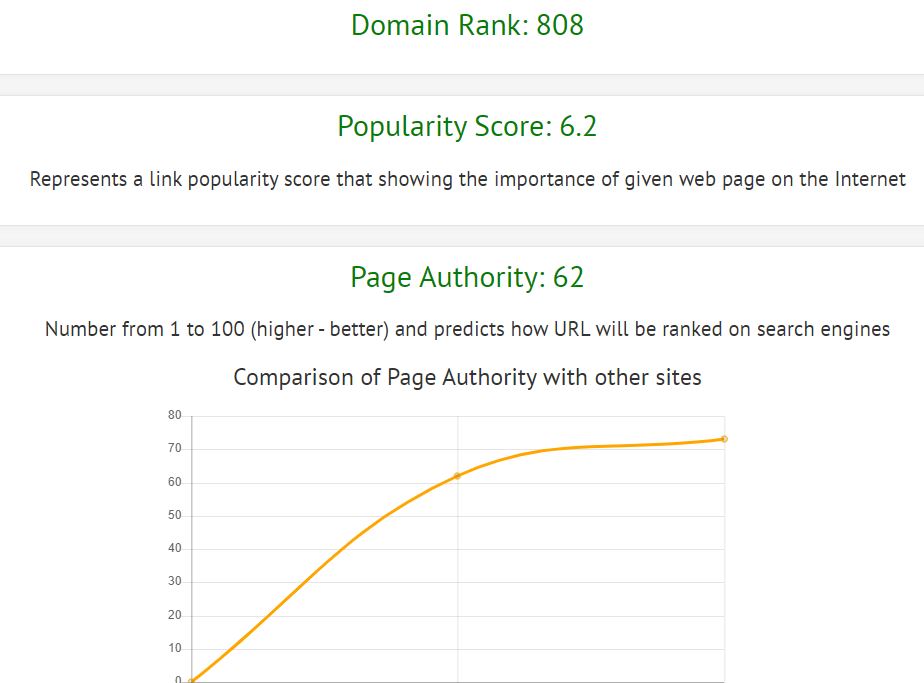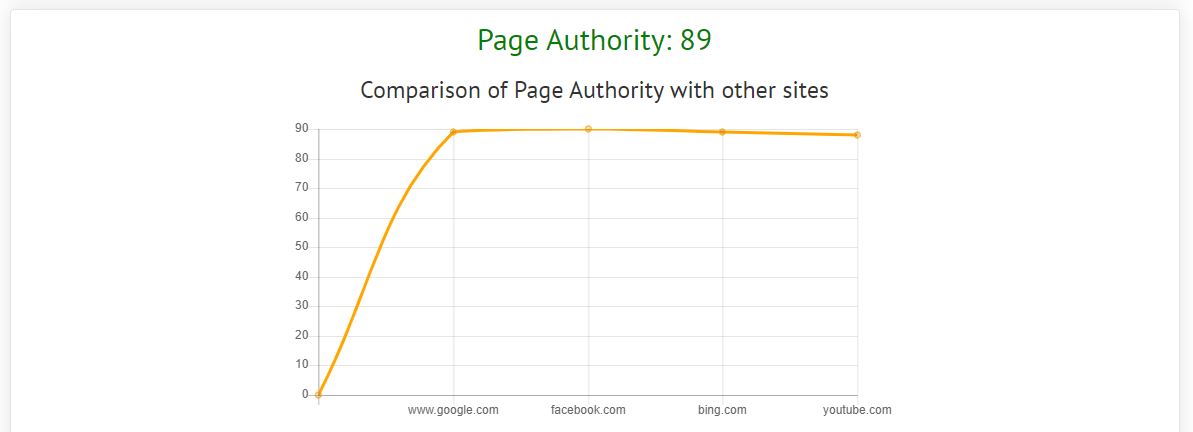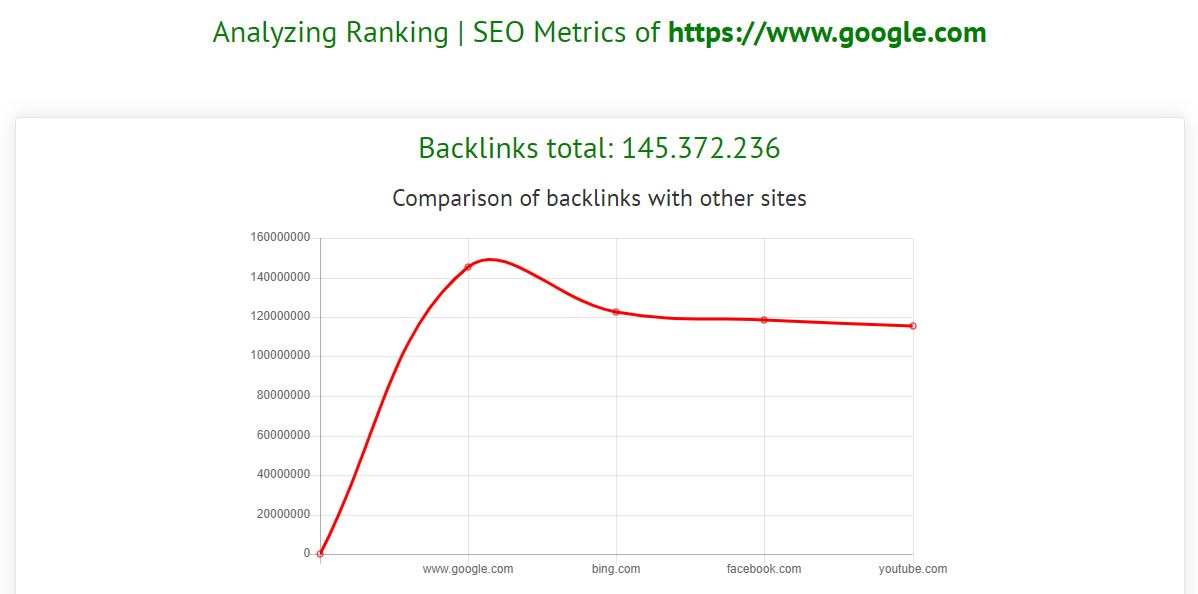Website Ranking Ckecker Tool Meaning
The Website Ranking Ckecker tool is an analysis tool that allows you to measure the ranking of a website, SEO analysis according to its popularity, web traffic intent, importance of your keywords and trend in the major search engines, all based on the measurements given by the main SEO analysis platforms on the Internet.
The measurements performed in the web ranking tool are as follows:
-
Domain Rank
General ranking of the domain, where the score starts from 1, where 1 corresponds to the highest score and the most important website on the Internet. -
Popularity Score
Score level from 0 to 10, from lowest to highest, where 10 corresponds to the highest score. Indicates the importance of a web page on the Internet according to its level of link popularity. -
Page Authority (PA)
Score carried out internally by the company Moz. It indicates in a general way what is the average ranking of a web page, specifically in the search results of the major search engines. This ranking ranges from 1 to 100. -
Domain Authority (DA)
Score that indicates the overall ranking of a domain or main name of a web page based on the search results it has in the major search engines. This ranking ranges from 1 to 100 and has been developed by the marketing company Moz. -
Backlinks total
Analysis of the total backlinks that the website has. The number of total external links pointing to that page. -
Traffic
Number of users expected to visit the website during the next month. -
Search Volume
Average of the total number of searches people have performed per month during the last 12 months. -
Traffic Costs
Estimated price in dollars of the sum of all organic keywords related to the website in Google AdWords. -
Click-Through Rate Scope (CTR)
Rating system that indicates how much traffic you can expect to get in the future, the higher the rating, the higher the chances of getting traffic. -
Indexed Pages
Number of total pages belonging to a complete website indexed in Google results. -
Search Trend Data
Google search trends over the last 12 months. -
SEO Difficulty
Score from 0 to 100 that indicates the difficulty a website has in positioning itself in search engines according to its most important keywords. The higher the number, the more difficult it is to rank. -
Off Page Difficulty
Score from 0 to 100, where 100 is the maximum, which measures the difficulty to rank the website in the top 10 results on the first page of Google for the search term. -
On Page Difficulty
Score from 0 to 100 that measures the difficulty that a website will have in ranking in the first 10 pages of Google according to its level of SEO optimization of its web pages. -
Organic Keywords
Number of keywords belonging to the analyzed website, which cause the site to appear in the first 100 Google search results. -
Domain Keywords Value
Total value of all the domain's ranked keywords. -
The cost per click (CPC)
Average price paid for a single click for the keywords that rank the website analyzed. -
Paid Competition
Number of advertisers that publish ads in Google Ads for the keywords for which the analyzed website is positioned.
How to use the Website Ranking Ckecker Tool
The use of Website Ranking Ckecker tool is extremely easy, we simply have to enter in the search box the web address of the specific
web page or main domain name to analyze and click on the SEARCH button.
In a few seconds we will get the following results:
- Domain Rank
- Popularity Score
-
Page authority or PA ranking followed by two analysis graphs:
- A graph comparing the PA of the analyzed page with the PA of other pages already analyzed.
- A graph showing the evolution of the PA of the analyzed page over time.
-
Domain authority or DA ranking followed by two analysis graphs:
- A graph comparing the DA of the analyzed page with the DA of other previously analyzed pages.
- A graph showing the evolution of the DA of this analyzed page over time.
-
Backlinks Analysis Section:
- Backlinks Totals
- Number of external equity links to the URL
-
Traffic Analysis Section:
- Traffic Total.
- Search Volume.
- Traffic Costs ($) in Google Ads.
- Click-Through Rate Scope.
- Indexed Pages in Google.
- Graph with the evolution of the website's Google search trend.
-
SEO Analysis Section:
- SEO Difficulty
- Off Page Difficulty
- On Page Difficulty
-
Keyword Analysis Section
- Organic Keywords
- Domain Keywords Value
- The cost per click (CPC)
- Paid Competition
- List of some analyzed pages with their statistics, such as Domain Rank, Page authority and the date of analysis.
Domain Ranking and Popularity Score
Ranking and popularity score are two important statistics calculated by internet search engines
A search engine is an application that allows users to search the internet. A website's ranking in a search results page is based on how relevant its content is to the user's query. Ranking high in search results increases your website's traffic and leads.
Ranking and popularity score are two important statistics calculated by internet search engines. They're used to determine a website's position in the
internet hierarchy. These scores are based on a website's age, market and availability. In addition to these factors, there are also technical aspects
such as web server speed and site code quality that affect web page ranking.
When updating a website, it's important to update all the necessary code for both ranking and popularity score calculation.
What is Domain Ranking and Popularity Score useful for?
Ranking and popularity score are essential for both online and off-line businesses because it affects their sales, marketing, and brand image. These scores are used by businesses to track their websites' performance and adjust their strategies accordingly. It's also used by internet users when searching for information on the internet.For example, people use Google when looking for information on different subject matters. In addition, these scores help businesses plan and promote new products or services. As you can see- both businesses and individuals use these scores to their advantage!
Domain ranking and popularity score are calculated using a formula that takes into account domain age, domain market, and domain availability
To calculate a domain ranking and popularity score, internet search engines take into account various factors- including age, market, and availability. New websites with fresh content have a high ranking and popularity score compared to older websites with less content. In addition, competition among websites is highest when they're first launched- which increases the score of new websites.
What is Page Authority and Why is it Important
Page Authority reflects the quality of the page
A webpage's authority rating is a number that reflects the quality of the page. High page authority is important in many aspects of life. It can help with research, education and social interactions. Therefore, it's essential to build high-quality webpages.
Concept of web page authority
The concept of web page authority is fairly new, but it has become an influential metric for assessing the quality of web pages. Generally speaking, the more authoritative a web page is, the higher its rating. Furthermore, highly ranked pages are more likely to rank well in search results. Many people consider Javan Chan's 2013 article 'What Is Page Authority and Why Is It Important?' as the starting point for understanding this metric. According to this article, 'page authority' refers to the number of reference links a webpage has. A reference link is a link to an actual webpage that contributes to a website's overall authority rating.
How to calculate the Page Authority
Page authority is typically calculated by counting the number of hyperlinks a webpage has in Google's index. Each hyperlink counts as one reference link. Therefore, if a webpage has 20 links, its page authority is 20 out of a possible 100 points. However, there are some factors that can affect how well a webpage performs in search results. Hyperlocal pages are more likely to perform well in local search results than global ones. Certain kinds of internal linking is also more likely to boost a webpage's performance. All of these factors are taken into consideration when calculating a webpage's ranking power.
How to increase the ranking of a page
Highly ranked pages are important for many reasons, especially online reputation management and search engine optimization efforts. Many people look online for information on topics they're interested in. If that information is accurate, it helps build trust and increase engagement levels. Additionally, Google uses page authority when calculating their ranking algorithms. The higher an article's rating, the better chance it has of ranking well in Google search results.
Essentially, we've come to rely on Google and other search engines for our information needs-
which explains why they're constantly improving their algorithms and metrics systems.
Webpage authority is gaining popularity as an influential factor for evaluating web content quality. Having a high page authority rating improves engagement
levels and helps users find relevant information easily. This metric is especially relevant for marketers who want to improve their website rankings or educate
customers via email campaigns. Interestingly enough, this metric has already affected our online reputation management efforts.
On a smaller scale, but no less meaningful scale, it affects our choices and behavior off the internet as well, ultimately determining the nature of our
future social interactions on both large and small scales.
What Domain Authority (DA) is and How to Earn It
Domain Authority is the natural result of creating high quality content and promoting your site effectively
Having a high ranking in search engine results is essential in promoting a website. However, creating quality content is essential in gaining a high ranking in other areas as well. High rankings in both search and social media are called domain authority. Understanding what determines your site's rank and working on improving it will help you earn higher rankings.Earning domain authority is a result of working hard to create relevant content and promote it through social media channels such as Facebook and Twitter. Working hard to create high quality content will help you gain an increase in your site's rank in both search and social media.
Search engines recognize DA when people use proper SEO techniques
Search engines recognize DA when people use proper SEO techniques. One way to improve your site's rank is by using keywords in your website's title, description and h1 tag. Choosing relevant keywords ensures that your content is relevant to the reader at all times and increases the likelihood of readers clicking on your links. Furthermore, ensuring that all of your text has relevant keywords uses white space effectively so that only relevant words show up. This is known as keyword stuffing, and while many believe it works, there's no scientific evidence to support it.
Maintaining a high ranking Web
Maintaining a high ranking in both search and social but particularly social media channels requires continual work on the part of the webmaster. This includes updating your site with fresh, quality content on a regular basis. Promoting new content regularly keeps readers interested in your site while increasing the likelihood of new visitors accessing your site via social media channels such as Facebook and Twitter.Regularly updating your site with fresh, quality content also increases the likelihood that search engines will recognize it as new content and update its rank accordingly.
Importance of backlinks from referring domains
Backlinks are an important factor in determining whether or not a website ranks within a specific search result.
Therefore, highly ranked webpages tend to have many backlinks pointing to them. Additionally, webmasters should focus their link building efforts on the
referring domains for their websites.
Not only does focusing on referring domains help with ranking, but it can also help with removing spammy links from your website.
Referring domains play an integral part in link building strategies; they're what create backlinks and therefore affect search engine rankings. Backlinks are created by linking to relevant pages from other websites- and the linking webpage is known as the referring domain. Therefore, the higher the number of referring domains a webpage has, the more likely it is to rank well in search results. However, relying on multiple high-quality referring domains can be tricky since some referrers may be more reliable than others.
Search engine guidelines discourage websites from using too many referring domains for malicious purposes such as redirecting Google traffic away from legitimate websites. Therefore, it's important to manage how many referring domains your website has so that your website remains accessible to legitimate users. Additionally, low bounce rates indicate that your referring domains have fewer probative qualities when it comes to ranking your website within search results. Low bounce rates can be caused by low traffic or both low traffic and low quality referring domains.
Explanation of Web Traffic and How to get it
We define web traffic as the number of visits by users, regardless of their origin, that a website has in a predetermined period of time.
Web traffic can be distinguished into two types of traffic:
- Web traffic where the total number of visits during a given period of time is counted. If a user accesses a page several times, his visits will be added to the total number of visits made in general.
- Web traffic where the number of unique visitors in a predetermined period of time is counted. If a user has visited a web page several times, it is only counted as a single visit in the total number of visits.
Good web traffic can lead to increased sales and more profitable future investments, or what is the same, a growth of the company it represents.
The best way to generate web traffic:
- SEO optimization.
- Email marketing campaigns.
- Assiduous publications in social networks.
- Generate content that provokes interest in users.
- Update old content.
- Good internal linking between the pages of the website itself.
- Good optimization for use on mobile phones.
There are other concepts where you can understand the web traffic more in depth, and how web traffic is related to marketing and advertisers such as Google Ads in the following link on "Web Traffic Monitoring Tools Utiliy and Important Concepts".
Factors that influence the Ranking of a Web Page
Ranking is a crucial feature of all major search engines. Ranking helps users navigate information easily by directing them to relevant websites. However, ranking can be tricky; different factors affect how high a website ranks in a given field. Using metrics and optimization techniques is a way to improve a website's ranking.
Ranking factors include one or more of the following:
- Number of pages
- Number of incoming links
- The rank and the quality of the website's content
Metrics that can determine the ranking of a website
Although it's not an exact science, metrics have been helpful in determining rankings. The most common metric used for ranking websites is Google's PageRank algorithm. Other metrics used for ranking include Google's Rich Snippets, how many HTTP requests a webpage makes and how many server resources it uses. All of these are measured using Google Analytics traffic data or server load tests.
Factors that increase the ranking of a web page
Search engine optimization (SEO) is the process of influencing search results to increase website traffic and sales. Techniques used to improve rankings include:Keyword research
Keywords are the words or phrases that direct searchers to specific websites.Writing quality content
Writing quality content ensures that your content is relevant, trustworthy and engaging enough to rank.On-page and Off-page formatting
Using various formatting techniques ensures that your pages are easy on the eyes and well-organized.
Parameters used by the main Search Engine Algorithms
Search engines use algorithms to calculate the best way to rank websites based on data from numerous sources. This includes:
- Web pages.
- Web crawlers.
- Links submitted by web developers
- Advertisers and other entities on the web
Conclusion
The data collected by these entities helps search engines determine which websites should rank high in search results.
Rankings help users find relevant information easily via Google, Bing or Yahoo! Ranking has become increasingly important as it influences user behavior
and sales growth for online businesses. Metrics help companies understand where they stand with regard to other websites in the same field or related fields.
When optimizing a webpage, search engine optimization techniques can improve rankings through quality content, keywords and formatting standards.


